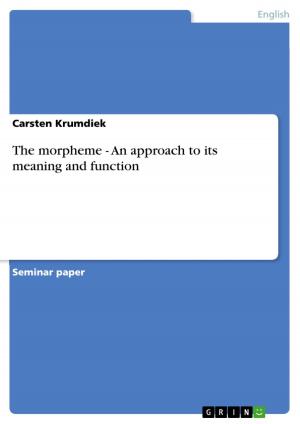'Everything is the proper stuff of fiction': Modernist Writing and Its Material
Fiction & Literature, Literary Theory & Criticism, British| Author: | Heiko Zimmermann | ISBN: | 9783638587662 |
| Publisher: | GRIN Publishing | Publication: | December 23, 2006 |
| Imprint: | GRIN Publishing | Language: | English |
| Author: | Heiko Zimmermann |
| ISBN: | 9783638587662 |
| Publisher: | GRIN Publishing |
| Publication: | December 23, 2006 |
| Imprint: | GRIN Publishing |
| Language: | English |
Seminar paper from the year 2002 in the subject English Language and Literature Studies - Literature, grade: 68 Leeds credits, University of Leeds (School of English), course: Modern Literature, 17 entries in the bibliography, language: English, abstract: The material modernist writing might dwell upon are the things which can be perceived and processed by the mind. An impressive example for this view is Virginia Woolf's short story 'The Mark on the Wall' in which she develops a story out of her imaginations about this tiny outer thing, which is actually a snail. The idea that everything becomes the 'proper stuff of fiction' is not very helpful in terms of a comparison to older literary periods. As it is now known that the mind of the author plays an important part, one only has to look closer at the author's mind and analyse what is going on there to draw conclusions about the subject matter. The 20thcentury showed a development of the world in a specific direction. There was an increasing number of ordered systems and a lower level of order (cf. Robert Musil,Der Mann ohne Eigenschaften,ch. 85). An example can be the legal machinery of the state, the food production process, the military industry, mechanized warfare, etc. The First World War emphasized this development very much. As reaction to these changes, new feelings towards society evolved. If one looks at European modernist artists, one can distillate eight general directions of these feelings (cf. Sheppart 16-7). First, there was the feeling of being trapped or lost among the decaying remains of semi-feudal systems that obstructed a sense of the future. This especially holds true for continental European artists before and in the First World War. An example is the Austrian Expressionist Georg Trakl, who expresses this feeling, e.g., in his well-known poem 'Verfall' (decay).
Seminar paper from the year 2002 in the subject English Language and Literature Studies - Literature, grade: 68 Leeds credits, University of Leeds (School of English), course: Modern Literature, 17 entries in the bibliography, language: English, abstract: The material modernist writing might dwell upon are the things which can be perceived and processed by the mind. An impressive example for this view is Virginia Woolf's short story 'The Mark on the Wall' in which she develops a story out of her imaginations about this tiny outer thing, which is actually a snail. The idea that everything becomes the 'proper stuff of fiction' is not very helpful in terms of a comparison to older literary periods. As it is now known that the mind of the author plays an important part, one only has to look closer at the author's mind and analyse what is going on there to draw conclusions about the subject matter. The 20thcentury showed a development of the world in a specific direction. There was an increasing number of ordered systems and a lower level of order (cf. Robert Musil,Der Mann ohne Eigenschaften,ch. 85). An example can be the legal machinery of the state, the food production process, the military industry, mechanized warfare, etc. The First World War emphasized this development very much. As reaction to these changes, new feelings towards society evolved. If one looks at European modernist artists, one can distillate eight general directions of these feelings (cf. Sheppart 16-7). First, there was the feeling of being trapped or lost among the decaying remains of semi-feudal systems that obstructed a sense of the future. This especially holds true for continental European artists before and in the First World War. An example is the Austrian Expressionist Georg Trakl, who expresses this feeling, e.g., in his well-known poem 'Verfall' (decay).















